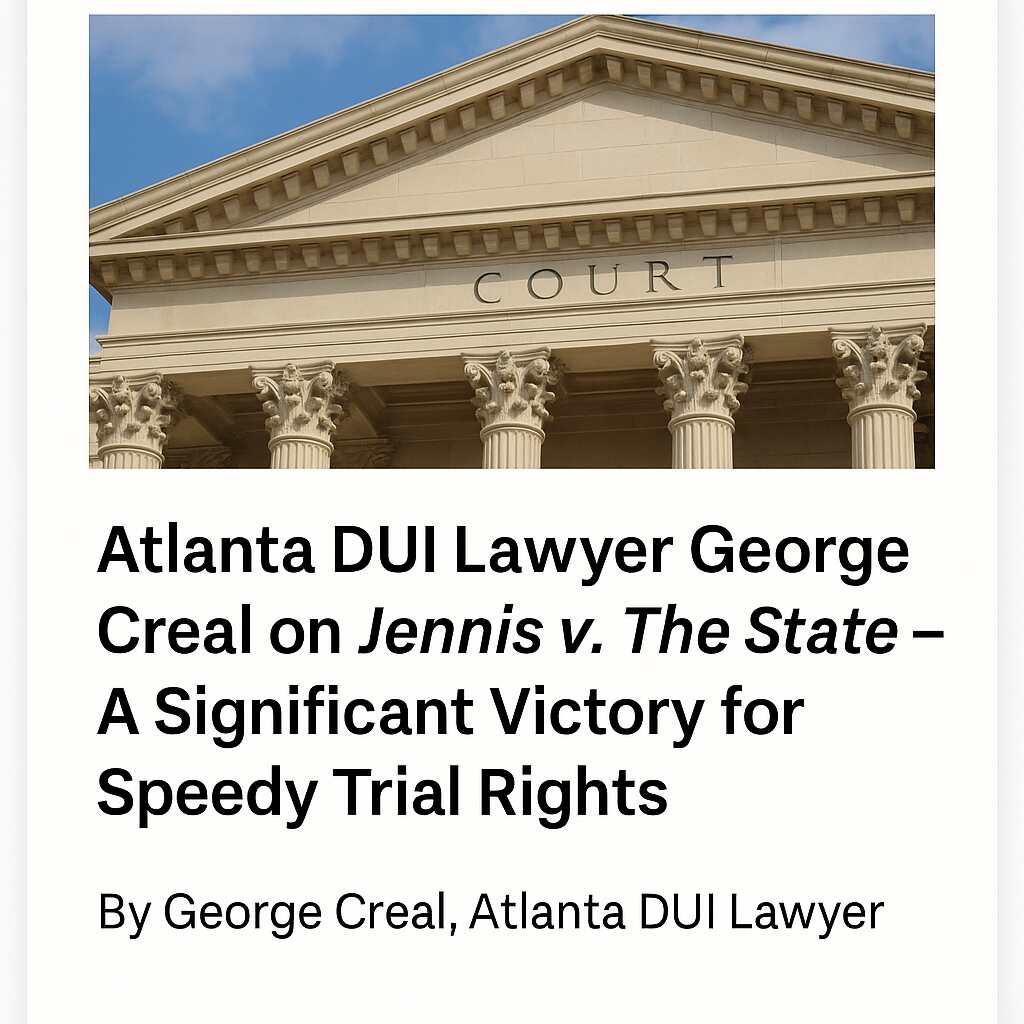
Case Background
Nidhi Jennis was charged with DUI (less safe), reckless driving, and failure to maintain her lane. On November 17, 2021, her attorney filed a series of motions, including a “Demand for Speedy Trial” under OCGA § 17-7-170. This demand was included in a 25-page packet of motions but was filed as a separate, single-page document with its own title, case number, reference to the speedy trial statute, and certificate of service. The packet was mailed to the court clerk, the state court judge, and the solicitor general’s office, in accordance with filing practices adapted during the COVID-19 pandemic.
Despite proper filing, the State did not respond to the speedy trial demand, and no hearing was held. In March 2024, Jennis moved for discharge and acquittal, arguing that her statutory right to a speedy trial had been violated. The trial court denied her motions, ruling that the speedy trial demand was not a “separate and distinct” document because it was “buried” at the end of the motion packet. Jennis appealed, and the Georgia Court of Appeals reversed the trial court’s decision.
The Court of Appeals’ Ruling
The Court of Appeals, in a unanimous decision penned by Judge Markle, held that Jennis’s speedy trial demand fully complied with the requirements of OCGA § 17-7-170(a). The statute mandates that a speedy trial demand be:
- Filed as a separate, distinct, and individual document.
- Clearly titled “Demand for Speedy Trial.”
- Reference OCGA § 17-7-170.
- Identify the case’s indictment or accusation number.
- Filed with the clerk of court and served on the prosecutor and the assigned judge (or chief judge if unassigned).
The Court found that Jennis’s demand met all these criteria. The document was a standalone motion, properly titled, included the case number and statutory reference, and was served on the required parties. The fact that it was mailed in a packet with other motions did not invalidate it, as it was not stapled to other documents and had its own certificate of service.
The Court relied heavily on its precedent in Rogers v. State (2016), a case involving similar facts where a speedy trial demand was upheld despite being filed in a packet with other motions. The Court rejected the trial court’s attempt to distinguish Rogers, emphasizing that the statutory requirements are clear and unambiguous. The Court also noted that mailing the documents (due to COVID protocols) rather than hand-delivering them was irrelevant, as the statute does not impose such a requirement.
Key Takeaways
- Strict Compliance with Statutory Requirements: The Jennis decision reaffirms that courts cannot impose additional requirements beyond those explicitly stated in OCGA § 17-7-170. As long as a speedy trial demand is filed as a separate document with the proper title, case details, and service, it is valid.
- Importance of Proper Filing Practices: While the Court upheld the demand in this case, it cautioned attorneys to file speedy trial demands independently to avoid potential disputes. At George Creal’s law office, we meticulously ensure that all filings meet statutory requirements to protect our clients’ rights.
- Remand for Further Proceedings: The case was remanded to determine whether other requirements of OCGA § 17-7-170(b) were met, such as whether juries were impaneled and qualified to try Jennis during the relevant court terms. This highlights the need for thorough documentation and evidence to support speedy trial claims.
Why This Matters for DUI Defendants
A speedy trial violation can lead to the dismissal of charges, which is a powerful defense strategy in DUI cases. The Jennis ruling strengthens protections for defendants by ensuring that technical filing issues do not undermine their statutory rights. For those facing DUI charges in Atlanta, this case underscores the importance of hiring an experienced attorney who understands the nuances of Georgia’s speedy trial laws.
How George Creal Can Help
At George C. Creal, Jr., P.C., Trial Lawyers, we have decades of experience defending clients against DUI and traffic-related charges across Georgia. Our team is well-versed in leveraging procedural defenses, such as speedy trial violations, to achieve dismissals or favorable outcomes. If you’ve been charged with a DUI, reckless driving, or other offenses, contact us today for a free consultation. Let us fight to protect your rights and secure the best possible result in your case.
Contact Us
George C. Creal, Jr., P.C., Trial Lawyers
Phone: (404) 333-0706
Website: www.georgecreal.com
Disclaimer
This blog post is for informational purposes only and does not constitute legal advice. Every DUI case is unique, and outcomes depend on specific facts and circumstances. Consult a qualified attorney for personalized legal guidance.

